


How to Choose the Right Dump Truck for Your Business in 2025?
Views: 0 Author: Site Editor Publish Time: 2025-07-28 Origin: Site









To pick the right dump truck for your business in 2025, you should match the truck’s abilities to what you need each day, the things you move, and how much money you can spend. Many businesses make mistakes because they do not check what they really need or forget to ask trusted dealers for help. Some people choose trucks with more power than needed or forget about safety and comfort features. A well-known brand like CJQC gives good support and has reliable dump truck models. Choose trucks that help your business work better and keep everyone safe.
Key Takeaways
Make sure your dump truck fits your daily jobs, materials, and work area. This helps you work better and stay safe. - Pick the right truck size and setup for your loads and job site. Think about if you work in a city or at a mine. - Choose a dump truck body and engine power that match your materials and how much you carry. This can help you use less fuel and have fewer repairs. - Think about buying new or used trucks. Balance the first price with costs for fixing, fuel, and safety features. - Work with a dealer and brand you trust. They should give good support, have parts, and offer good service.
Dump Truck Needs
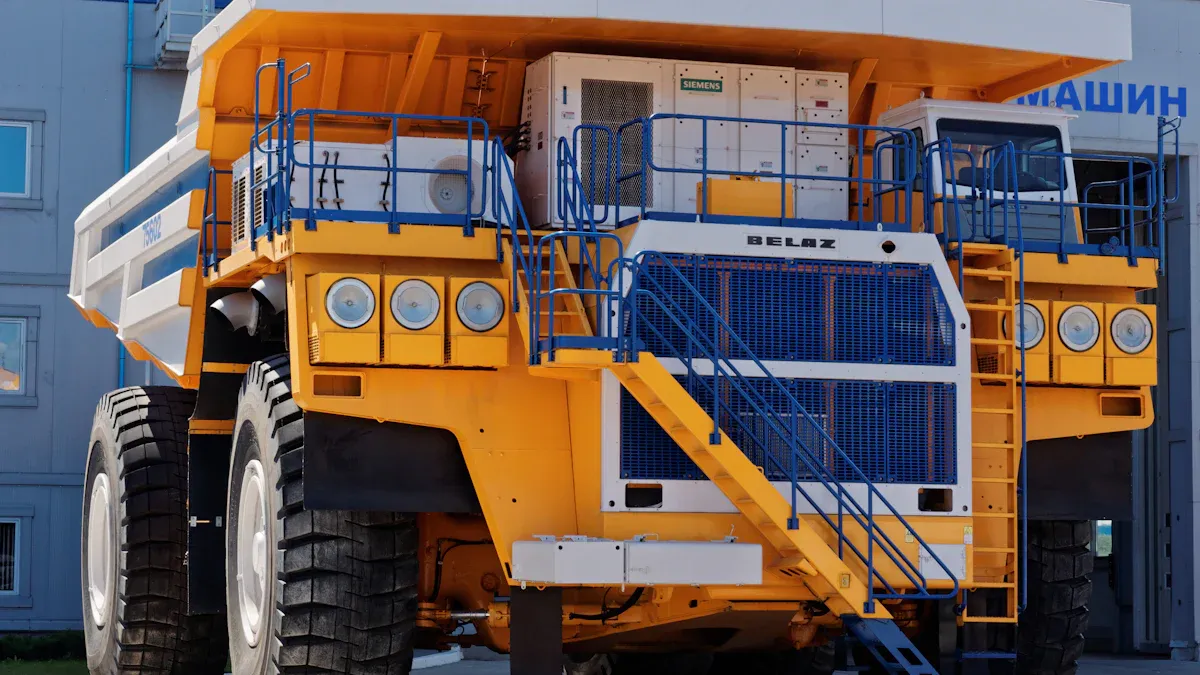
Job Types
First, think about the main jobs your business does. Dump trucks are important in many fields. In construction and landscaping, you use them for short trips. They move things like sand, gravel, dirt, or rocks. These jobs need trucks that unload fast and turn easily in small spaces. If you work in mining or quarrying, you need trucks for heavy loads. These trucks must go far and carry a lot. They need strong frames and high load capacity. Big projects, like highways or bridges, need trucks for big loads and long hours.
Here is a table to help you match dump truck classes to job types:
| Dump Truck Class | Weight Range (GVWR) | Typical Job Types | Key Requirements |
|---|---|---|---|
| Light-Duty | 6,000 - 14,000 lbs | Residential landscaping, small construction sites | Maneuverability, flexibility, suitable for tight spaces, smaller loads |
| Medium-Duty | 14,001 - 26,000 lbs | Municipal services, larger construction projects | Increased load capacity, balance of power and agility |
| Heavy-Duty | 26,001+ lbs | Mining, large-scale infrastructure development | High load capacity, durability, compliance with heavy-duty regulations |
If you are a contractor or hauler, pick a truck that fits your main job. CJQC has models for every class, so you can find one that works for you.
Materials and Loads
Think about what you move most often. Dump trucks usually carry loose things like dirt, gravel, sand, and rocks. These are common in construction, mining, landscaping, and waste jobs. The kind and weight of your load matter. For example, mining may need trucks that carry up to 358 tons. Construction and demolition can mean mixed loads that are hard to measure. You might need trucks with strong bodies for heavy or rough debris.
Standard dump trucks use hydraulic systems to tilt and dump loads, so they are good for moving gravel, sand, or dirt.
How heavy and rough your materials are also matters. If you move sharp or heavy debris, you need a truck with a steel body. For lighter things like fine gravel or dirt, an aluminum body helps you carry more and saves fuel. The shape of the truck body is important too. Curved or semi-elliptical bodies handle bumps better and make unloading easier. Rectangular bodies give you more space for big loads.
Work Environment
Where you work changes the kind of dump truck you need. Trucks work in many places, like construction sites, mines, roads, and cities. Each place has its own problems. If you work on rough ground, you need strong suspension and trucks that turn well. Articulated dump trucks are best for rough ground. They bend in the middle and handle bumps better. If you work in cities or small spaces, you need a truck that turns easily and fits in tight spots.
Common places for dump trucks:
Construction sites (sand, gravel, dirt, demolition waste)
Mining and quarrying
Road work and site prep
Landscaping and city services
Snow removal and waste jobs
Local rules also matter. Some states have weight laws that change how long or heavy your truck can be. You might need a longer frame or more axles to follow these rules. The kind of material you haul and the ground you drive on help you pick the right chassis, suspension, and engine.
When you match your dump truck to your job, materials, and work area, your business works better. CJQC has many trucks for different needs, from the Maker 4x2 Flat Dump Truck for city jobs to the Yulong 8x4 Muck Truck for mining and heavy loads. This helps you find the right truck for your work.
Dump Truck Types
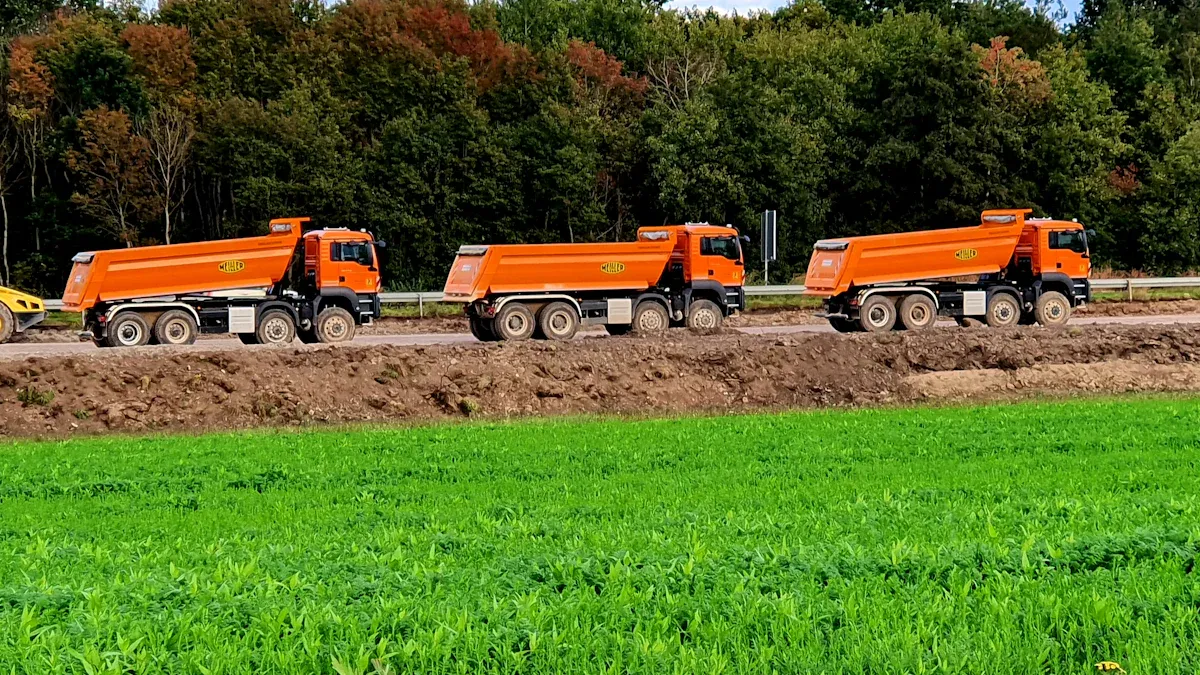
Configurations
You need to know the main dump truck configurations before you make a choice. Each type works best for certain jobs and environments. The most common configurations are 4x2, 4x4, and 8x4. These numbers show how many wheels the truck has and how many of them get power from the engine.
| Configuration | Typical Business Applications | GVWR Range (lbs) | Key Features and Notes |
|---|---|---|---|
| 4x2 / 4x4 | Landscaping, city services, small construction | 35,000 – 43,000+ | Easy to drive in tight spaces, good for lighter loads, better for city work |
| 6x4 / 6x6 | Bulk hauling, medium construction | 43,000 – 69,000+ | Balances load and movement, handles bigger jobs |
| 8x4 / 8x6 / 8x8 | Mining, heavy construction, large projects | 66,000 – 92,000+ | Handles heavy loads, strong and stable, best for tough jobs |
| 10x4 / 10x6 | Specialized heavy-duty work | Above 88,000 | For the heaviest loads and special uses |
Smaller trucks like 4x2 and 4x4 work well in cities and tight job sites. You can turn them easily and park them in small spaces. Larger trucks like 8x4 carry more weight and work best in mining or big construction projects. They have more wheels and axles, so they stay stable and safe with heavy loads.
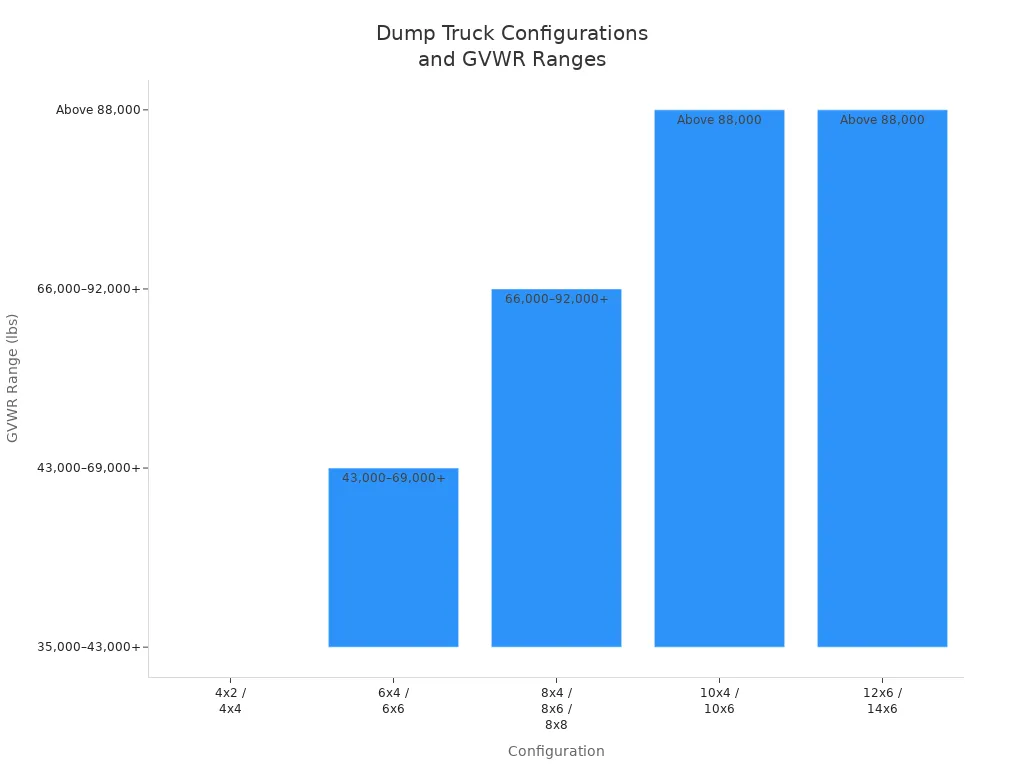
You will also see other types of dump truck configurations. Here is a table to help you compare them:
| Dump Truck Configuration | Key Features | Advantages | Disadvantages |
|---|---|---|---|
| Standard Dump Trucks | Rear-tipping bed, versatile | Good for many jobs, easy to drive | Only dumps to the back, not for every job |
| Side Dump Trucks | Side-tipping bed | Dumps fast, stable when unloading | Can tip if not careful, not for all materials |
| Articulated Haulers | Hinged cab, all-wheel drive | Great off-road, turns well | Lower payload than big rigid trucks |
| Off-Road Dump Trucks | Big tires, strong frame | Handles rough ground, big loads | Too big for roads, hard to move in cities |
| Roll-Off Trucks | Removable containers | Easy to load and unload | Best for debris, not for loose bulk |
| Transfer Dump Trucks | Extra trailer for more load | Carries more, still easy to drive | Needs special equipment |
You should match the configuration to your main job. For example, if you work in mining, you need a strong 8x4 or off-road dump truck. For city work, a 4x2 or 4x4 is better.
Payload and Axles
The payload is how much weight your dump truck can carry. The number of axles affects this. More axles mean you can carry heavier loads and follow the law. Each state has rules about how much weight you can put on each axle. If you add axles, you spread the weight out. This keeps the truck safe and legal.
More axles help you:
Carry more weight safely
Spread the load so the road does not get damaged
Stay within legal weight limits
Make the truck more stable
Tag axles (extra wheels that do not get power) help balance the load. You need to check the rules in your state. Some jobs need special licenses for trucks with many axles. Always make sure your truck matches the weight rules. This keeps your business safe and avoids fines.
Tip: If you haul heavy loads often, pick a dump truck with more axles. This helps you carry more and keeps you within the law.
Choose the Right Dump Truck Body
You need to choose the right dump truck body for your work. The body style changes how much you can carry, how easy it is to unload, and how much you spend on fuel and repairs. The three main body styles are rectangle, half-round, and semi-elliptical.
Rectangle bodies: These give you the most floor space. They are strong and stable. You can carry heavy loads like rocks or debris. The flat floor makes it easy to load and unload.
Half-round bodies: These have a curved shape. They are lighter and better at handling impacts. Material slides out easily, so less sticks inside. They are not good for carrying pallets or equipment because the floor is not flat.
Semi-elliptical bodies: These mix the best parts of rectangle and half-round. You get a flat floor and a curved shape. This style works for many jobs and materials.
The material of the body matters too. Steel bodies are best for rough, heavy, or sharp materials like gravel or concrete. They last a long time but are heavier. Aluminum bodies are lighter, so you can carry more and save fuel. They resist rust but cost more and are not as strong as steel.
| Material Type | Impact on Efficiency | Maintenance Costs | Notes |
|---|---|---|---|
| Steel | Heavy, uses more fuel | Needs more care | Strong, good for rough jobs |
| Aluminum | Light, saves fuel | Less care needed | Best for lighter loads, resists rust |
| Composite | Very light | Low maintenance | High cost, special uses |
Custom dump truck bodies can help you work faster and spend less on repairs. Features like strong frames and special coatings make the truck last longer. When you choose the right dump truck body, you make your business safer and more efficient.
Key Features
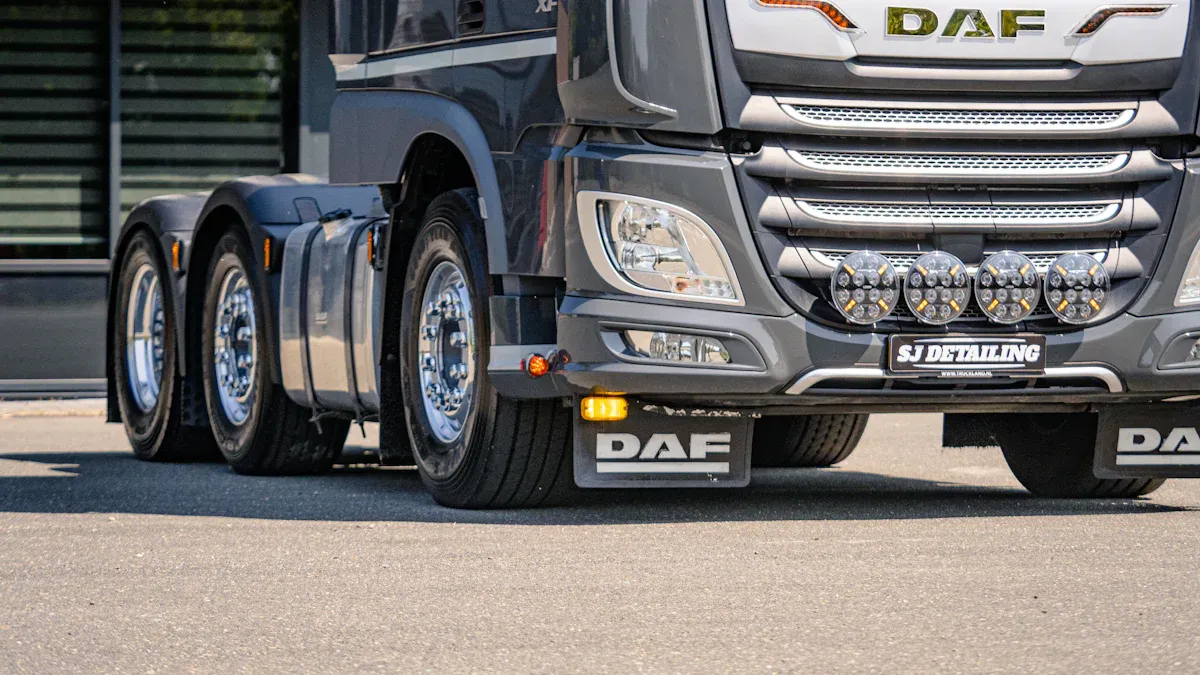
Engine Power
Engine power is very important when picking a dump truck. The right engine helps you move heavy things and work in hard places. Most dump trucks in 2025 have engines from 200 to over 500 horsepower. You need to match the engine power to your job and how much you carry. Here is a table that shows engine power for different dump truck models:
| Manufacturer | Model(s) | Engine Power (hp) | Payload Capacity (metric tons) | Application Type |
|---|---|---|---|---|
| Hyundai | HA30 | 362 - 375 | 28 | Mid-size articulated dump truck |
| Hyundai | HA45 | 483 - 500 | 41 | Heavy-duty articulated dump truck |
| John Deere | P-Tier 260, 310, 410, 460 | 260 - 481 | N/A | Construction and mining |
| Liebherr | TA230 | 360 | 28 | Mid-size articulated dump truck |
| Volvo | A60H | High (not specified) | 27 - 60 (U.S. tons) | Heavy-duty articulated hauler |
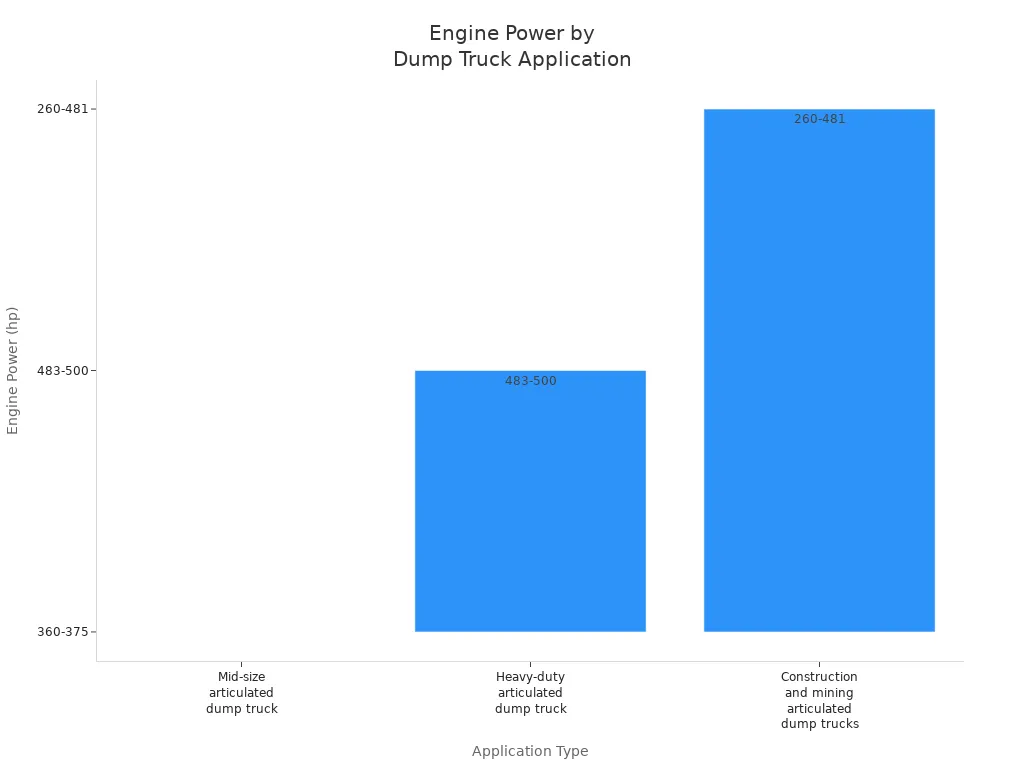
A stronger engine gives you more power for big jobs, but it can use more fuel. New diesel engines use smart technology to save fuel and give strong torque at low speeds. This helps you carry heavy loads and work on rough ground without wasting fuel.
Safety and Durability
Safety features keep you and your team safe. Modern dump trucks use smart systems to lower accidents. Some new safety features are:
Telematics that warn about bad weather or road problems
Sensors that check seat belts and speed
Dash cams that record the road
Automatic Emergency Braking (AEB) and Electronic Stability Control (ESC)
Cameras to reduce blind spots
These features help you avoid crashes and keep everyone safe. Strong frames, good brakes, and regular care also help your truck last longer. You should look for durability signs like engine power, load capacity, and easy maintenance. Trucks with these things work better and last longer in tough jobs.
Custom Options
You can pick custom features for your business. Many companies want:
Different chassis lengths or axle setups
Steel or aluminum bodies
Special tailgates or tarping systems
GPS, backup cameras, and onboard weighing systems
Custom paint and logos
Custom options help you work faster and safer. They also make your truck worth more if you sell it later. Things like toolboxes, better seats, and extra lights make your truck easier to use and keep drivers happy. When you pick the right custom options, your dump truck works better for your business every day.
Cost of Commercial Truck Ownership
New vs. Used
When you look for a commercial truck, you must decide between new and used models. New dump trucks cost more, but they come with the latest technology, better fuel efficiency, and full warranties. Used trucks save you money upfront, but they may need more repairs and often lack modern safety features. Here is a price comparison to help you see the difference:
| Truck Type | Price Range (USD) New | Price Range (USD) Used |
|---|---|---|
| Standard Dump Truck | $70,000 - $400,000 | $20,000 - $150,000 |
Used commercial trucks can have issues like engine wear, suspension problems, or electrical faults. Maintenance costs for used trucks are usually higher, and you may not get a warranty. Always inspect used trucks carefully before you buy.
Maintenance and Fuel
Owning a commercial truck means you must plan for regular maintenance and fuel costs. New trucks often cost less to maintain, with annual expenses between $1,500 and $3,000. Used trucks can cost $3,000 to $5,000 each year for repairs. Fuel is another big expense, ranging from $5,000 to $15,000 per year. CJQC dump trucks help you save money because they use fuel-efficient engines and need less maintenance. This means you spend less time and money fixing your trucks and more time working.
Tip: Regular maintenance keeps your commercial truck running longer and helps you avoid costly breakdowns.
Financing and ROI
You have many ways to finance a commercial truck. Equipment financing uses the truck as collateral, so you need only a small down payment. Some lenders offer loans up to $1 million with flexible terms. You can also find options with no collateral or deferred payments. Most loans last 36 to 60 months, and interest rates depend on your credit score and business history.
To measure your return on investment (ROI), subtract all your costs—like fuel, maintenance, insurance, and driver wages—from your revenue. Then divide that number by your total investment cost. Many businesses see an ROI between 10% and 30%. Choosing a reliable, fuel-efficient commercial truck like those from CJQC can help you reach a higher ROI by lowering your operating costs and boosting uptime.
Dealer and Brand Choice
Dealer Support
When you choose a dump truck, you need a dealer who stands behind their products. Good dealer support helps your business run smoothly. Look for these signs of strong support:
Friendly and helpful customer service with positive reviews from other buyers.
Quick and reliable after-sales support to keep your trucks working.
A dealer with a long history and a good reputation in the transportation industry.
You want a dealer who answers your questions and solves problems fast. This keeps your trucks on the road and your jobs on schedule.
Inventory and Service
A good dealer offers a wide range of dump trucks and parts. You should check if the dealer has the models you need for your transportation jobs. Make sure they keep spare parts in stock. This helps you avoid long waits when you need repairs.
Dealers with strong service teams can fix your trucks quickly. They may offer training programs for your drivers and mechanics. Some dealers also provide technical support to help you get the most from your equipment. Ask about warranty coverage, so you know what repairs the dealer will handle.
Tip: Dealers with a large network can help you wherever your business takes you.
Brand Reputation
Brand reputation matters when you invest in dump trucks. Trusted brands like CJQC have a proven record of reliability and performance. When you choose a well-known brand, you get peace of mind. You know your trucks will last and perform well in tough conditions.
Look for brands that offer strong after-sales service and technical support. Check for positive feedback from other transportation businesses. A good brand stands by its products and helps you succeed.
To choose the right dump truck, you should follow these steps:
Assess your needs and job requirements.
Learn about different dump truck types and features.
Compare costs and benefits.
Pick a trusted dealer with strong support.
Make sure your dump truck matches your business goals and daily work. You can talk to brands like CJQC for expert advice. Use this checklist to help you make a smart choice. Start your selection process today!
FAQ
What size dump truck should I choose for my business?
You should match the truck size to your main job. Small jobs need light-duty trucks. Large projects or mining need heavy-duty models. Check your typical load weight and work site space before you decide.
How often should I service my dump truck?
You should follow the manufacturer’s schedule. Most trucks need service every 5,000 to 10,000 miles. Regular checks keep your truck safe and lower repair costs.
Can I customize my dump truck for special jobs?
Yes! You can add custom bodies, extra axles, or special safety features. Many dealers offer options like GPS, backup cameras, or toolboxes. Customization helps your truck fit your business needs.
What is the average lifespan of a dump truck?
Most dump trucks last 7 to 10 years with regular care. Heavy use or poor maintenance can shorten this time. Good brands like CJQC build trucks for long service.
How do I know if a dealer is reliable?
Look for positive reviews, strong after-sales support, and a wide inventory. Reliable dealers answer your questions and help you with service or parts quickly.






